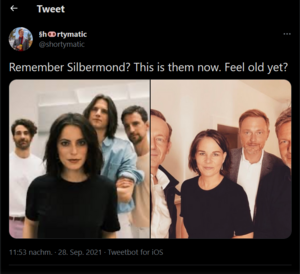Benutzer:Johanna
Aus exmediawiki
immaterial materialities
+++thoughts+++
web3 discourse can be seen as emblematic for "immaterial materialities" the idea to put everything on the blockchain ... because we have that technology elevates technology from mean to end.
xxx
different strands of new materialism... some try to find a common theme in relationality based on intra'action. some of this thought is based on or lends itself to post-marxist anticapitalistic thought.. but then a lot of web3 can also be "justified" in new materialist manner, e.g. "decentralization", "non-hierarchical" resembles ANT... in this way new-materialist thought contributes to the left-washing of crypto venture capitalism - at least in my brain in my neurons this devilish combination has occured a couple of times and i found myself wondering: wait, isnt the capitalist destruction of the planet or the hyperstructure of amazon-the-company in the end merely intra'acting forces? some ideas of "new materialism", "more-than-human matter", are easily exploited / commodified, e.g. when considering economy as an "ecosystem", its participants/financial trends as "actants", ... what is actually a "natural" element here? (e.g. trading as n.k.hayles-style "semiotics")
Johanna (Diskussion)
the idea of frontiers that are continuously moved towards new spheres to be colonized
what web3 advocates forget: " They lack any engagement with the political economy of global capitalism or even a cursory analysis of the many social movements that are still contesting it." (Morozov)

+++ ressources +++
Web3 is a blockchain-based backend and infrastructure layer on top of existing network technologies that aims at restructuring the internet in a radically decentralized and individual way. [...] Web3 also is very invested in tokens (pardon that pun, I couldn’t let it go): Everything should be a token. A domain? Should be a token. A blog post? Should be a token. Your account on some form of Twitter-like service? Should be a token. Web3 turns everything possible into tokens because that’s what works well on blockchains but also to enable “real” ownership. [...] Web3 is just a new space for accumulation There is a reason that so many VC people are into Web3. That investors like Andreesen Horowitz are pushing Web3 so hard: It’s a new space for accumulation. [...] Cryptocurrencies are a so-called zero-sum game: That means all the money that someone takes out, someone else has to put in. One person’s gains are another person’s losses. [...]
(Some
people even call blockchains “negative-sum games” because while financially nobody can win without others losing the whole game destroys the environment while doing so, leaving the world worse off than it was before regardless of wealth distribution) [...]
source: Tante - The third web
"The advocates of Web3 are quite explicit about this: we’ve got this beautiful map on our hands – all that’s missing is the territory it is supposed to refer to. Perhaps, this is the right mindset for the Age of the Metaverse: if there's no reality, we'll create one by talking it into existence.
But what is the right materialistic analysis of this strange turn to idealism, with venture capitalists leading the way? What is the political economy that has produced this stunning but territory-free map? For one, the business model of most Web 3 ventures is self-referential in the extreme, feeding off people’s faith in the inevitable transition from Web 2.0 to Web3." source: https://the-crypto-syllabus.com/web3-a-map-in-search-of-territory/
"blockchain technologies bring about a process of emplotment: an organisation of characters and events. First, we show how blockchain technologies actively configure plots such as financial transactions by rendering them increasingly rigid. Secondly, we
show how they configure abstractions from the world of action, by replacing human
interactions with automated code. Third, we investigate the role of people’s interpreta- tive distances towards blockchain technologies: discussing the importance of greater
public involvement with their application in different realms of social life."
https://link.springer.com/content/pdf/10.1007/s13347-016-0239-x.pdf